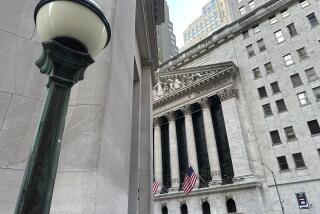Stocks, Bond Yields Rise as Fed Steps In to Stop Dollar’s Fall
The battered dollar plunged toward its post-World War II low against the Japanese yen Friday before the Federal Reserve Board unexpectedly intervened and carried the greenback to a small gain by the end of the day. But the dollar still fell against major European currencies.
Meanwhile, stocks rebounded after the Fed’s intervention in the currency markets and better-than-expected earnings were reported by Ford Motor Co.
However, the falling dollar drove Treasury bond yields higher amid concern that a weak U.S. currency would lead to inflation, thus eroding the value of fixed-income securities.
The Fed’s action, announced in a brief statement from Treasury Secretary Lloyd Bentsen, marks the first time the central bank has intervened to prop up the dollar against the Japanese yen since August.
After ending mixed in Europe, the dollar fell sharply in early domestic trading on what market analysts said was carry-over from Thursday’s dip on lower-than-expected figures for U.S. economic growth in the first quarter.
The Treasury bond market selloff Thursday may also have contributed to the dollar’s weakness, dealers said.
Data showing economic growth generally supports the dollar because it tends to make dollar-denominated investments more attractive and thus brings capital into the United States.
But the recent declines in American stock and bond markets have overshadowed evidence of economic strength and have hurt the U.S. currency, analysts said.
The dollar, which had been threatening to fall below 100 Japanese yen for the first time, bounded higher on the Fed’s move. The dollar closed in New York at 101.50 yen, up 0.15 after having fallen to 100.65 earlier in the day, just above a post-World War II low of 100.35 yen set in August.
However, the greenback closed lower against the German mark, ending at 1.654 marks, down from Thursday’s 1.663.
Analysts questioned how long the rally would last and said further action may be needed to prop up the currency.
“The Fed broke the dollar’s free fall, that’s all,” said David De Rosa, director of foreign exchange trading at Swiss Bank Corp. “People are still eager to sell.”
The Fed probably bought dollars to calm the stock and bond markets, traders said. Bonds plunged Thursday amid concern that the weak dollar would cheapen U.S. assets and exacerbate inflation by making imports more expensive.
“The Treasury wanted to show investors that it’s still safe to invest in U.S. stocks and bonds,” said Ezra Zask, president of Ezra Zask Associates, a hedge fund in Norfolk, Conn., with $180 million under its management. “They want the dollar stronger.”
On Wall Street, the Dow Jones industrial average rose 13.38 to 3,681.69, adding 33.01 for the week. In the broader market, advancing issues outnumbered decliners by about 3 to 2 on the New York Stock Exchange, where about 293.98 million shares changed hands.
Bonds swung widely throughout Friday’s session. After a drop of nearly two points Thursday, the price of the Treasury’s main 30-year bond was trading down almost another point Friday when Bentsen announced the government’s intervention in the currency market. Yields then recovered somewhat.
The Treasury’s bellwether 30-year bond yield ended the week at 7.30%, up from 7.26% the day before. Its price, which moves in the opposite direction, fell 7/16 point, or $4.38 per $1,000.
In addition to the currency pressure, the bond market has been weakened by heavy supply. Demand was light for $28 billion in new two- and five-year notes issued earlier this week.
Individuals and small-portfolio bondholders led the early-morning selloff, after Thursday’s retreat by large investors, which had been spurred by data on the nation’s gross domestic product.
Stocks surprised some analysts by outperforming bonds for the first time in many sessions. Friday’s performance indicates there is fundamental strength underlying the equities market, said Alfred Goldman, vice president at A.G. Edwards & Sons Inc. in St. Louis.
“If stocks were really vulnerable, the bond selloff would have given us an excuse to take it down further,” he said.
Among the market highlights:
* Transportation issues rose as reports of a tentative settlement in the Teamsters strike pushed trucking company shares higher. Consolidated Freightways rose 1 1/4 to 27 1/2.
* Transports were also supported by airline stocks, including Delta, which extended Thursday’s gains after saying it will lay off about 20% of its staff. Delta rose 2 1/4 to 47 1/2.
The Dow Jones transportation index rose 24.50, or 1.5%, to 1,660.13.
* The stock market was able to turn its focus away from rising interest rates and to good earnings reports. Ford Motor rose 7/8 to 58 3/8 after reporting sharply higher earnings.
* Scientific-Atlanta jumped 4 3/8 to 33 1/2 after reporting strong first-quarter earnings late Thursday that prompted Goldman Sachs to upgrade its rating on the stock.
Overseas markets also closed lower. Mexico City’s Bolsa index fell 27.13 points, or 1.17%, to 2,294.1. In Frankfurt, the DAX-30 average index closed 5.24 points lower at 2,245.98. London’s Financial Times 100-share average ended the week at 3,125.3, off 4.6 points.
The Tokyo market was closed for a holiday and will reopen Monday.
Market Roundup, D4
DAILY DIARY Interest Rates: 30-year T-Bond 7.30% 1-year T-Bill 5.07%
More to Read
Inside the business of entertainment
The Wide Shot brings you news, analysis and insights on everything from streaming wars to production — and what it all means for the future.
You may occasionally receive promotional content from the Los Angeles Times.










